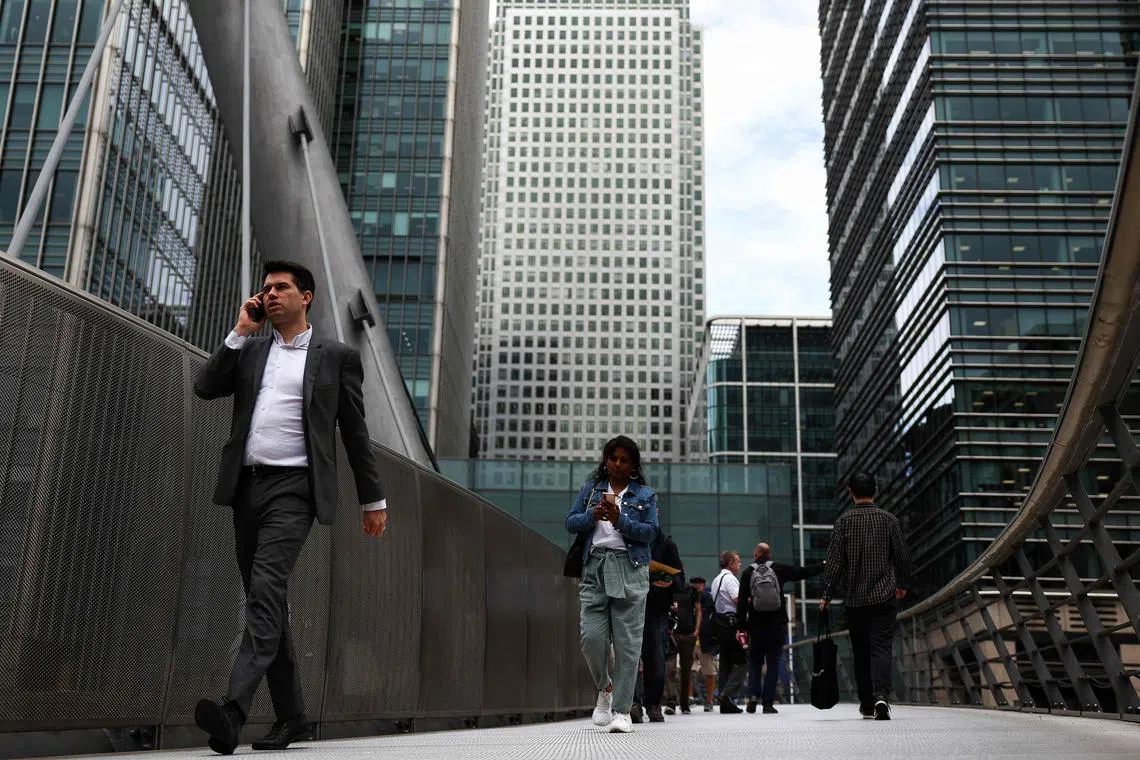UK recession risk grows as firms cut staff at a sharp pace
Sign up now: Get ST's newsletters delivered to your inbox

While the economy is weakening, there was more evidence of inflation cooling.
PHOTO: AFP
Follow topic:
Britain’s private sector companies shed workers at the fastest pace since the pandemic and the depths of the financial crisis, underscoring the Bank of England’s decision to halt interest rate increases for the first time in almost two years.
S&P Global’s composite Purchasing Managers’ Index slipped to 46.8 in September from 48.6 the month before, the sharpest decline in output since January 2021 when the UK was in lockdown. The reading was worse than economists expected and plunged the private sector deeper into contraction territory.
The survey was cited in the BOE’s decision to hold interest rates at 5.25 per cent
The PMI adds to a growing list of indicators that point to a lacklustre second half of the year for the economy. Retail sales data also out Friday showing a smaller-than-expected bounce back in August. That suggests retail may be a drag on gross domestic product figures for the third quarter – unless September delivers a big bounce higher.
S&P also said there had been an “abrupt turnaround” in the jobs market, with staff cuts the fastest since October 2009, excluding lockdowns during the pandemic.
The closely-watched survey adds to concerns that the UK is heading into downturn a little more than a year before the deadline for the next election. That’s a concern for Prime Minister Rishi Sunak’s government, which is trailing in polls and is hoping to spark growth before voters got to polls.
The PMIs signalled a second straight month below the 50 threshold separating growth and contraction and point to a downturn in GDP. Further weakness in services, the UK’s largest sector, dragged on activity.
However, more signs the labour market is loosening adds to confidence that the Bank of England’s fight against inflation is gaining traction.
“A recession is looking increasingly likely in the UK,” said Mr Chris Williamson, chief business economist at S&P Global Market Intelligence. “A major concern in the inflation outlook has been wage growth, but with the survey now signalling the sharpest fall in employment since 2009, wage bargaining power is being eroded rapidly.”
S&P said that private sector business activity fell at the steepest pace since March 2009, aside from the pandemic. Businesses blamed the cost-of-living crisis and higher interest rates for the subdued demand.
While the economy is weakening, there was more evidence of inflation cooling. Input price inflation saw its biggest monthly fall in 2023 so far.
Separate figures on retail sales for August showed a partial recovery from a weather-related slump in July but probably not enough to reverse a declining trend. Volumes rose 0.4 per cent in the month after a 1.1 per cent drop the month before.
The sharp decline in July
A surge in retail prices over the last 18 months means consumers are paying more to buy fewer goods for their money. The value of sales in August was 17 per cent above pre-pandemic levels in February 2020, while the volume of those sales 1.5 per cent below.
“With the impact of higher interest rates continuing to build, retail growth in the third quarter is likely to be sluggish, in line with the wider economy,” said Mr Martin Beck, chief economic advisor to the EY ITEM Club.
The gloomier economic data in recent weeks is yet to weigh on household sentiment, a new survey showed on Friday.
GfK’s consumer confidence index rose 4 points to minus 21 in September, the strongest level since January 2022 before the Russian invasion of Ukraine triggered a surge in energy bills. The survey shows confidence has recovered sharply from the record lows recorded in September last year with households much more upbeat about the outlook for their personal finances. BLOOMBERG

